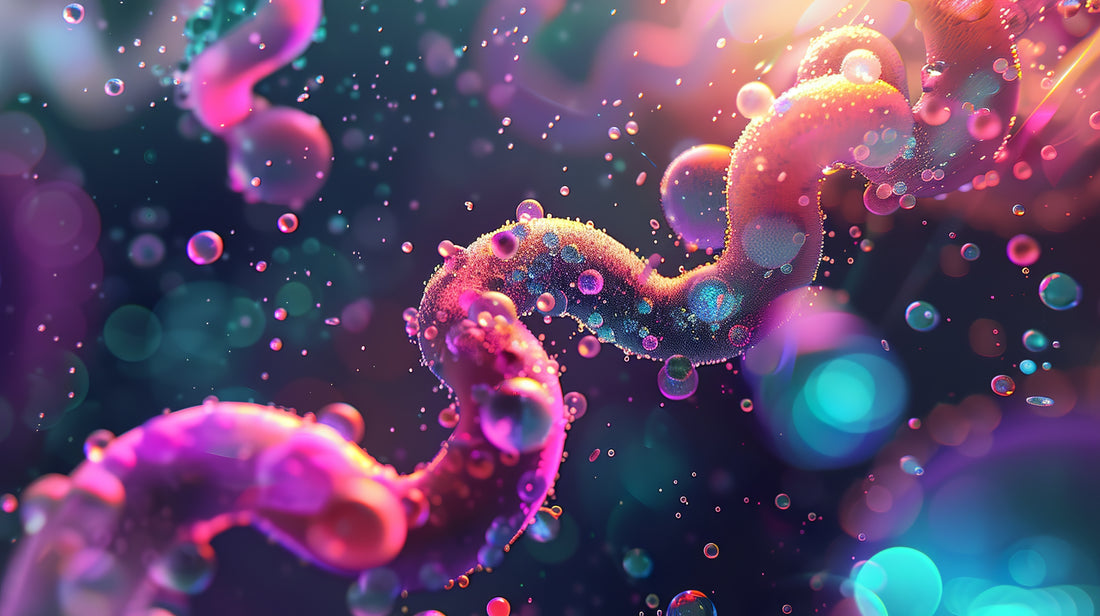Reviewed by Anneleen Segers, PhD
The microbiome plays a pivotal role in your gut health, but also positively impacts other systems in your body. Learn how the gut supports your physical and mental health and how you can build a healthier gut microbiome.
What Is the Gut Microbiome?
Your gastrointestinal (GI) tract, also known as your gut, houses good and bad bacteria and trillions of other microbes in communities that make up your gut microbiome.1 The majority of these microbes take residence in your large intestine (the colon).2
This collection of bacteria, single-cell organisms, and other microbes that populate the gut are gut microbiota. These microbiota have evolved with us over thousands of years, and over time we have developed a symbiotic (mutually beneficial) relationship.3
Gut Microbiome Evolution
It is believed that the blueprint for our gut's microbiome is established at birth. When a newborn emerges from the womb, it is exposed to millions of microorganisms from both its mother and the environment. The gestational age of the newborn and the manner in which it is delivered influences the quantity and diversity of its gut microbiome. Studies have shown that by the first week of life, newborns have developed a complex ecosystem.5,6
The gut flora continues to evolve as evidenced through changes in a child's diet — from breast milk or infant formula to the inclusion of complementary foods and then fully transitioning to solid foods as they get older. This introduces more variety in the diet, thereby largely influencing the diversity of the child's gut microbiome. It is thought that between the ages of one to three years, the child's gut microbiome is almost fully established.7
During childhood, gut microbiome diversity is important for immune system development and we know that the gut microbiome's dynamics change throughout all of life's stages.
Let's learn more about how our gut microbiome continues to benefit our overall health and well-being below.
How Microbiota Support Our Health
Immune Support
The microbes in our gut microbiome have a large impact on our health and immunity. In fact, the GI tract is home to approximately 70% of your immune cells, making the gut an integral part of your immune defense.
Some gut bacteria, like Akkermansia muciniphila, help to strengthen our intestinal barrier, regulating its permeability. Also, there are other good bacteria, or probiotics, that are working hard to protect you (the host) by aligning themselves in the intestine to block receptor sites, preventing bad bacteria from attaching to the intestinal wall.
Aids In Digestion
Adequate dietary fiber is an essential part of a healthy diet. Indigestible fiber found in foods such as fruits, vegetables, and legumes that cannot be broken down into smaller glucose molecules, passes through the GI tract undigested. Certain bacteria assist in the digestive process by producing enzymes that break down the fiber in the colon. The end product is the production of short-chain fatty acids (SCFAs), like butyrate, propionate, and acetate which are beneficial to the gut microbiome.2 Some bacteria in the gut also produce vitamins like vitamins B and K.
Communication — The Gut-Brain Axis
Can you believe we have a two-way communication pathway that allows bacteria in our gut to connect different systems in the body to the brain? Amazing, right? This sophisticated pathway is known as the gut-brain axis.6,8
The physical connection between your GI tract and brain is evident if you have ever experienced that "funny feeling" in your stomach before giving a presentation or starting a new job. The vagus nerve, which runs from your brain to your stomach, is signaling that feeling of unease, which by the way is completely normal.
This connection between our central nervous system and enteric nervous system (the nervous system linked to the GI tract) allows the GI tract and brain to talk with each other.6,8 In doing so, the messages sent and received are to ensure our emotional and physiological balance is in check.
Our gut microbiota and our internal systems are always communicating. For instance, dysbiosis, or an imbalance in our microbiota, can impact our immune system and result in mild inflammation and an impaired immune response, both of which can eventually lead to neurological conditions.8
Many of the chemical neurotransmitters that relay messages between your gut and brain are produced by or assisted by gut microbes. Some of these neurotransmitters may impact our mood, response to stress, sleep, and even our appetite.
Research continues and additional clinical studies are warranted to better understand the role of the gut, its microbiota and how it affects its host.
Consider Positive Changes
Adding healthy foods to your diet from plant-based foods like fruits, vegetables, whole grains, and legumes will support a healthy gut microbiome.
Bump up your intake of foods that are good sources of prebiotics. Prebiotics are non-digestible food ingredients that support the growth of probiotics in the gut.6 They help to fuel or provide food for the probiotics so they can flourish and reside in a symbiotic state.
Prebiotics can be found in fiber-rich foods like oats, dried beans, legumes, carrots, Jerusalem artichokes, apples, bananas, garlic, and onions.
Eating foods that are rich in live and active cultures (probiotics) include yogurt, kefir, sauerkraut and kombucha. However, if you are looking to supplement your diet, it is always wise to consult your healthcare provider to determine if you are a good candidate for probiotic supplements.
Keep in mind, as we continue to support our gut microbiome, we need to maintain a healthy lifestyle. So stay physically active, eat a variety of whole foods, get quality sleep, and take care of your mental well-being too.
*These statements have not been evaluated by the Food and Drug Administration. This product is not intended to diagnose, treat, cure or prevent any disease.
Citations
- Thursby, Elizabeth, and Nathalie Juge. "Introduction to the human gut microbiota." The Biochemical journal vol. 474,11 1823-1836. 16 May. 2017, doi:10.1042/BCJ20160510.
- Zhang, Ping. "Influence of Foods and Nutrition on the Gut Microbiome and Implications for Intestinal Health." International Journal of Molecular Sciences, vol. 23, no. 17, Aug. 2022, p. 9588.
- Malard, Florent, et al. "Introduction to Host Microbiome Symbiosis in Health and Disease." Mucosal Immunology, vol. 14, no. 3, May 2021, pp. 547–54.
- Aagaard K, Ma J, Antony KM, Ganu R, Petrosino J, Versalovic J. The placenta harbors a unique microbiome. Sci Transl Med. 2014 May 21;6(237):237ra65. doi: 10.1126/scitranslmed.3008599. PMID: 24848255; PMCID: PMC4929217.
- Mackie, Roderick I., et al. "Developmental Microbial Ecology of the Neonatal Gastrointestinal Tract." American Journal of Clinical Nutrition, vol. 69, no. 5, May 1999, pp. 1035S-1045S. https://doi.org/10.1093/ajcn/69.5.1035s.
- Chakrabarti, Anirikh et al. "The microbiota-gut-brain axis: pathways to better brain health. Perspectives on what we know, what we need to investigate and how to put knowledge into practice." Cellular and molecular life sciences : CMLS vol. 79,2 80. 19 Jan. 2022, doi:10.1007/s00018-021-04060-w.
- Derrien, Muriel et al. "The Gut Microbiota in the First Decade of Life." Trends in microbiology vol. 27,12 (2019): 997-1010. doi:10.1016/j.tim.2019.08.001.
- Marcason, Wendy. "Probiotics: Where Do We Stand?" Journal of the Academy of Nutrition and Dietetics, vol. 113, no. 10, Oct. 2013, p. 1424.




